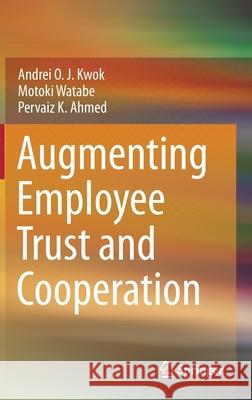Augmenting Employee Trust and Cooperation » książka



Augmenting Employee Trust and Cooperation
ISBN-13: 9789811623424 / Angielski / Twarda / 2021 / 133 str.
Augmenting Employee Trust and Cooperation
ISBN-13: 9789811623424 / Angielski / Twarda / 2021 / 133 str.
(netto: 460,04 VAT: 5%)
Najniższa cena z 30 dni: 462,63
ok. 22 dni roboczych.
Darmowa dostawa!
Chapter 1: Rewards: An intersection between psychology and management
This book is an essential guide for academics and practitioners to understand employees’ differences in personality and how best to motivate them accordingly. The authors provide an in-depth perspective of how organizations can better prepare for the new realities of the workplace. Amidst the war for talent and a continually evolving workplace that has reduced employee psychological attachment, employees prefer to be treated as individuals with the expectation of individual recognition and reward. The authors draw from their personal, corporate, and research experience by combining interdisciplinary perspectives (organizational behavior, human resource management, psychology, sociology, economics) to offer holistic insights into individual expectancy and motivation integral to a successful employer-employee interaction.
Interestingly, research remains lacking on the effects of excessive extrinsic rewards on trust and cooperation. Hence, this book fulfills significant gaps in vital areas that existing studies have not yet sufficiently addressed. These areas are psychological contract, excessive extrinsic rewards, and individual differences in personality (locus of control and general trust). The authors use scenario-based laboratory experiments to examine the moderating effects of locus of control and general trust that underscore employee expectations. The differential effects contribute to insight on behavioral outcomes in the workplace that result from employee perception, personality, and intention towards the provision of rewards.
Consequently, the book dispels the discrepancies between economists and psychologists about the efficacy of rewards. Findings demonstrate that although excessive extrinsic rewards augment all employees’ trust and cooperation, it is vital for employers to reward selectively those who are most deserving. Findings offer a deeper understanding of the saliency, efficacy, and judiciousness of excessive extrinsic rewards. Employers will benefit by understanding how best to tailor rewards to motivate each employee.1997-2026 DolnySlask.com Agencja Internetowa
KrainaKsiazek.PL - Księgarnia Internetowa









